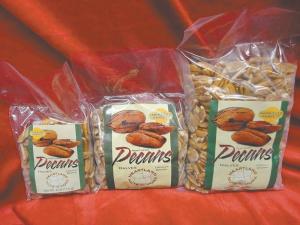2019 - Volume #43, Issue #3, Page #09
[ Sample Stories From This Issue | List of All Stories In This Issue | Print this story
| Read this issue]
Co-Op Finds Markets For Nuts
 |
“Our co-op is an outgrowth of the Nebraska Nut Growers,” says Larry Martin, a longtime member and executive director. “They were planting trees and producing nuts with no way to market products, so they started the co-op about 40 years ago.”
The co-op promotes members’ production as premium nuts. Trees are grafted for faster production and higher quality nuts. Members select scion wood from trees based on production and taste, preferring nuts with thin shells and large lobes for bigger nutmeats. This selection and grafting is especially important with the black walnuts the co-op markets.
“We use only the finest improved varieties of grafted black walnuts with delicious, larger nutmeats,” says Martin. “The nuts are harvested at their peak and carefully processed for a sweeter and lighter tasting nutmeat than traditionally grown black walnuts.”
Martin explains that most producers let the nuts fall from the tree, and the husk turns black before harvest and selling. This turns the nutmeat darker and often gives it a bitter taste. Heartland nuts are harvested on the tree, hulled, washed and dried.
“We have 46 member orchards,” says Martin. “We have commercial producers with 500 trees or more and smaller producers who are in nut production for the fun of it.”
Grafting is a preferred production method by members, explains Martin. It shortens the time needed to get a tree into production. Using scion wood from a proven, premium nut producing tree also ensures the grafted tree will produce the same.
“If we plant a pecan or black walnut from seed, it can take 15 years to produce a nut and a hickory takes 25 years,” says Martin. “If you graft scion wood from a tree that is producing nuts to a seedling, it starts producing much sooner.”
Walnuts are grafted only to walnuts. However, pecan and hickory scion wood can be grafted to each other, as well as to themselves.
Martin explains that the co-op members also produce a superior quality pecan. Over a 25-year period, southern cultivars were acclimated to member orchards.
“Our pecans mature in about 3 months versus 6 months in southern areas,” says Martin. “As a result, the nutmeats retain more oil.”
“We get quite a few calls from people interested in planting a tree line or orchard,” says Martin. “It takes time to establish, and grafting can hasten that.”
Martin has information on nut tree grafting available to share. He recommends prospective grafters go to A.M. Leonard as a source for equipment.
“We sell nutmeats in packages from 4 oz. of pecans or 8 oz. of black walnuts to 30-lb. bags, as well as other related products,” says Martin. “You can buy them online or at our store. If you stop by, you can see displays of nutcrackers in our nutcracker museum.”
Contact: FARM SHOW Followup, Heartland Nuts ‘N More, 206 W. 2nd St., Valparaiso, Neb. 68065 (ph 402 784-6887; sales@heartlandnutsnmore.com; www.heartlandnutsnmore.com).

Click here to download page story appeared in.

Click here to read entire issue
To read the rest of this story, download this issue below or click here to register with your account number.




